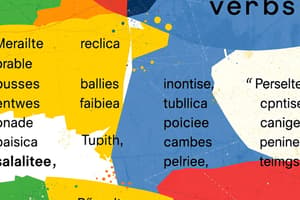Podcast
Questions and Answers
The Preterito indefinido is used to describe actions that were completed at a specific point in the _____
The Preterito indefinido is used to describe actions that were completed at a specific point in the _____
past
Regular -ar verbs in the first person singular form end with -_____ in the Preterito indefinido.
Regular -ar verbs in the first person singular form end with -_____ in the Preterito indefinido.
é
The verb 'ser' in the first person singular form in Preterito indefinido is _____
The verb 'ser' in the first person singular form in Preterito indefinido is _____
fui
Signal words such as 'ayer' mean _____ in English.
Signal words such as 'ayer' mean _____ in English.
Actions that occurred once in the past are a main use of the _____.
Actions that occurred once in the past are a main use of the _____.
In the case of regular -er verbs, the first person singular form ends with -_____ in the Preterito indefinido.
In the case of regular -er verbs, the first person singular form ends with -_____ in the Preterito indefinido.
A common mistake is confusing the Preterito indefinido with the _____ tense.
A common mistake is confusing the Preterito indefinido with the _____ tense.
The conjugation of 'hacer' for 'yo' in the Preterito indefinido is _____
The conjugation of 'hacer' for 'yo' in the Preterito indefinido is _____
An example of a completed action using the Preterito indefinido is 'Ayer _____ un libro.'
An example of a completed action using the Preterito indefinido is 'Ayer _____ un libro.'
The ending for 'ellos' in regular -ar verbs is -_____ in the Preterito indefinido.
The ending for 'ellos' in regular -ar verbs is -_____ in the Preterito indefinido.
Flashcards are hidden until you start studying
Study Notes
Preterito indefinido
-
Definition: The Preterito indefinido is a Spanish past tense used to describe actions that were completed at a specific point in the past.
-
Uses:
- Actions that occurred once in the past.
- Actions that are part of a timeline or series of events.
- Completed past actions not connected to the present.
-
Forming the Preterito indefinido:
- Regular Verbs:
-
-ar verbs:
- yo: -é
- tú: -aste
- él/ella/usted: -ó
- nosotros/nosotras: -amos
- vosotros/vosotras: -asteis
- ellos/ellas/ustedes: -aron
-
-er and -ir verbs:
- yo: -í
- tú: -iste
- él/ella/usted: -ió
- nosotros/nosotras: -imos
- vosotros/vosotras: -isteis
- ellos/ellas/ustedes: -ieron
-
- Regular Verbs:
-
Irregular Verbs:
- Example conjugations:
- ser/ir: fui, fuiste, fue, fuimos, fuisteis, fueron
- tener: tuve, tuviste, tuvo, tuvimos, tuvisteis, tuvieron
- hacer: hice, hiciste, hizo, hicimos, hicisteis, hicieron
- estar: estuve, estuviste, estuvo, estuvimos, estuvisteis, estuvieron
- Example conjugations:
-
Key Signal Words:
- ayer (yesterday)
- anteayer (the day before yesterday)
- hace (time ago)
- el año pasado (last year)
- en 1990 (in 1990)
-
Examples:
- Ayer compré un libro. (Yesterday I bought a book.)
- El año pasado viajamos a España. (Last year we traveled to Spain.)
-
Common Mistakes:
- Confusing with the imperfect tense (which describes ongoing actions or situations).
- Forgetting irregular conjugations.
By utilizing these points, learners can grasp the concepts, formation, and application of the Preterito indefinido effectively.
Preterito indefinido
- Definition: The Preterito indefinido is a Spanish past tense used to describe completed actions at a specific time in the past.
- Uses
- Actions that happened once in the past.
- Actions that are part of a timeline or series of events.
- Completed past actions not connected to the present.
- Forming the Preterito indefinido:
- Regular Verbs
- -ar Verbs:
- yo: -é
- tú: -aste
- él/ella/usted: -ó
- nosotros/nosotras: -amos
- vosotros/vosotras: -asteis
- ellos/ellas/ustedes: -aron
- -er and -ir Verbs:
- yo: -í
- tú: -iste
- él/ella/usted: -ió
- nosotros/nosotras: -imos
- vosotros/vosotras: -isteis
- ellos/ellas/ustedes: -ieron
- -ar Verbs:
- Irregular Verbs:
- Example conjugations:
- ser/ir: fui, fuiste, fue, fuimos, fuisteis, fueron
- tener: tuve, tuviste, tuvo, tuvimos, tuvisteis, tuvieron
- hacer: hice, hiciste, hizo, hicimos, hicisteis, hicieron
- estar: estuve, estuviste, estuvo, estuvimos, estuvisteis, estuvieron
- Example conjugations:
- Regular Verbs
- Key Signal Words:
- ayer (yesterday)
- anteayer (the day before yesterday)
- hace (time ago)
- el año pasado (last year)
- en 1990 (in 1990)
- Examples:
- Ayer compré un libro. (Yesterday I bought a book.)
- El año pasado viajamos a España. (Last year we traveled to Spain.)
- Common Mistakes:
- Confusing the Preterito indefinido with the imperfect tense (which describes ongoing actions or situations).
- Forgetting irregular conjugations.
Studying That Suits You
Use AI to generate personalized quizzes and flashcards to suit your learning preferences.




